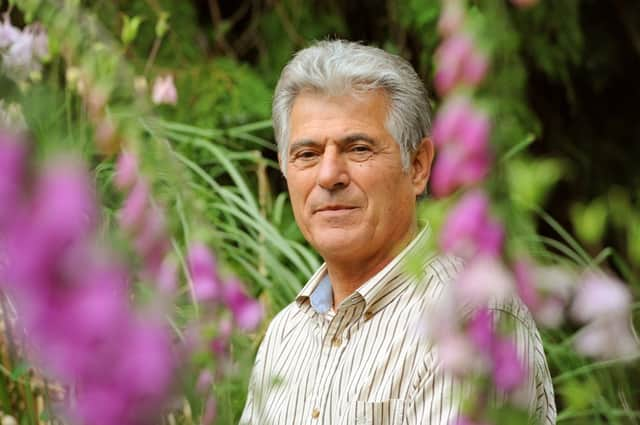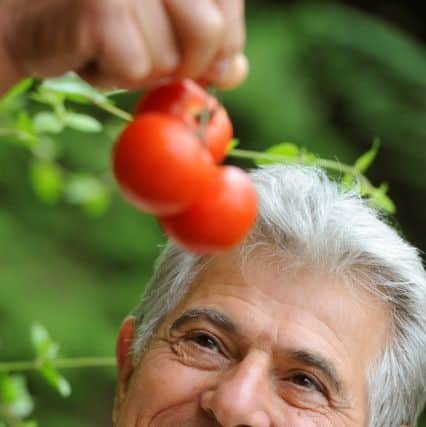THE INTERVIEW: Is genetic modification and GM food good or bad? Expert grower and horticulturist urges us to keep an open mind


Would you eat genetically modified (GM) food? The gut reaction of the majority of us it seems is to say ‘no’.
It is a question the Prime Minister refused to answer recently, despite being asked ten times.
Advertisement
Hide AdAdvertisement
Hide AdBut the chances are, he, you and most of us already have – or at least we are likely to have consumed meat, milk or eggs from animals fed on GM maize or soya, that is imported into the EU in large quantities.


There is no requirement for such products to be labelled differently and only one supermarket in the UK assures customers, at least for the time being, its supply chain is GM free.
The debate concerning genetically modified organisms, or GM foods, was reignited recently by a keynote speech made by Owen Paterson, the Environment Secretary. Calling for a more informed discussion on genetic modification, Mr Paterson said he owed a duty to the British public to reassure us that GM is safe, proven and beneficial.
However, with frightening Frankenstein foods making the headlines again, and surveys showing the majority of shoppers wanting GM food banned from supermarkets, the debate was already becoming reactionary and ideological before a more reasoned approach could even begin.
Advertisement
Hide AdAdvertisement
Hide AdMost reports mentioned the Flavr Savr tomato, which in 1994 in the US became the first commercially grown genetically modified product to be granted a licence for human consumption.
Intrigued by the issues, and prompted by repeated images of the red fruit, it was time to contact our very own tomato expert, Tony Girard from West Chiltington, for a more rational discussion about GM.
Tony is not an expert in GM, nor does he have vested interests or stakes in companies associated with the technology.
Instead, the 69 year old is a horticulturist who was at the forefront of commercial tomato growing in the UK for more than 30 years, responsible for the expansion of Sussex-based large scale tomato producer Van Heyningen Brothers to around 200 acres under glass.
Advertisement
Hide AdAdvertisement
Hide AdThe vice chair of the SCI Horticultural Group and past president of The Institute of Horticulture was also instrumental in pioneering the large scale use of the growing of crops in ‘grow bags’ and developed the pot herb business in the UK, the product of which is now very familiar in all supermarkets.
He now works for Koppert Biological Systems and, as its UK Director, helps to support the production of crops with little or no use of harmful chemicals – an awesome arsenal of ‘good guys’ consisting of bugs, bacterium and fungi used to control pests instead.
Chatting in the beautiful gardens of his Wells cottage, we discussed the definition of ‘natural’ and why GM causes such great concerns for so many.
Holding a tomato from his kitchen, Tony reflected how the original tomato wasn’t sweet, was very small, and looked distinctly unattractive. It was also thought to be poisonous.
Advertisement
Hide AdAdvertisement
Hide Ad“Everything that we eat these days started off as being something which is found in nature – but it’s been selected and reselected, cultivated and nurtured until it is something that we want,” said Tony, emphasising the ‘we’, before adding: “As opposed to what nature provided us with in the first place.
“So, we can call what we see today perfectly natural, but natural compared to when? 100 years ago? 1 million years ago?
“Everything evolves, and with tomatoes, the cross pollination breeding programmes that have taken place over many years bring us to where we are now,” he said, looking again at his shop-bought specimen.
Mankind has always applied science and technology, with selective breeding in the past and new fertilizers and pesticides more recently, to achieve the results we have wanted.
Advertisement
Hide AdAdvertisement
Hide AdSo, is GM just an extension of this historical process - the appliance of science on the genetic level, now that advances in technology permit such manipulation? Or is GM a true step-change?
“It is a step-change,” asserted Tony, going on to describe how with genetic engineering genes are removed from one plant species and moved to another to facilitate desirable characteristics.
And the same process can be carried out between an animal species and plant which he said was ‘far more concerning’ and is ‘difficult for most people to comprehend’.
“It has been described as like Frankenstein science, maybe – that is one way of describing it but I don’t see it that way,” he said.
Advertisement
Hide AdAdvertisement
Hide Ad“But it is science, and all of us benefit from science one way or another.
“There are bad things which have happened and still will, but should that prevent us from harnessing the good because of the fear of the bad?
“That doesn’t really take us forward,” he said, answering his own question.
For most of Tony’s career in the commercial growing business, GM was either non-existent or in its infancy. But what the technology could offer has always been desired.
Advertisement
Hide AdAdvertisement
Hide Ad“Customers would come to me and say we want something earlier, later, bigger, fatter, wider, striped, better tasting, and I would say ‘yes’, ‘fine’, if you want to wait ten years then maybe we’ll have something better!
“GM can help, not always, but can help that to happen faster,” said Tony, before questioning: “Is it good? Is it bad?” This time he left his rhetorical questions hanging. But Tony is a realist, and regardless of morality, there will always be a commercial imperative to improve yields, flavour or the look of products.
The UK and the EU are losing their competitive edge and falling behind other global regions less constrained by ideological concerns about GM.
Frustrated how the GM debate has been closed down in recent times here, with consumers and the public often left ignorant and confused amidst the rival fanaticisms of global agribusinesses and environmental campaigners, Tony said: “We must remain open minded.
Advertisement
Hide AdAdvertisement
Hide Ad“We should take the trouble to be well-informed and therefore decisions should always be made on good solid information.
“ Unfortunately good solid information doesn’t always come to the fore - it is all too often manipulated or contrived,” he said.
Undoubtedly, there are significant issues with GM, but it is very hard to argue they only concern safety fears regarding GM products and their consumption by humans.
More pressing perhaps should be concerns regarding ecological contagion, as well as economic implications, since GM techniques and crops are subject to intellectual property laws.
Advertisement
Hide AdAdvertisement
Hide Ad“To say no to GM isn’t right, that’s just burying one’s head in the sand,” concluded Tony.
“But just saying there is no problem at all is also wrong,” he added. “There’s been improvement in what we do as mankind forever.
“GM is part of development and progress, ending up with plants that are more resistant to pests, diseases, drought and high/low temperatures.
“Also requiring less fertilizers and harmful chemicals and in doing so, exerting less pressure on the environment.
Advertisement
Hide AdAdvertisement
Hide Ad“Let’s not forget that many materials and minerals are being used up at an unsustainable rate.
“We just have to produce more of what we want or need while reducing inputs.”
Tony did state that the alternative would be to initiate global population control, reducing mankind’s numbers to a lower more sustainable rate of increase. But this is an issue even more fraught with moral, environmental and existential issues than the genetic modification debate.
Returning to the topic of conversation and genetic engineering’s potential to solve issues we face, Tony said: “It is fascinating, and it can also be frightening if people are frightened of the unknown.
“Other people get hugely excited by the unknown.
Advertisement
Hide AdAdvertisement
Hide Ad“What I certainly know of it now is nothing compared to the possibilities which there may be coming down the line in the future.
“Is it good? Is it bad? I will leave that for others to judge.”
What do you think? Email [email protected], or leave a comment below...